- Home
- Michelle Moran
Cleopatra’s Daughter: A Novel Page 33
Cleopatra’s Daughter: A Novel Read online
Page 33
There was near mutiny.
“Can he do that?” Alexander exclaimed.
“Any of the judices can stop the trial,” Magister Verrius said. “I suspect they will deliver a verdict in the morning.”
“And will we come to see it?” Julia asked.
Magister Verrius looked at Octavia. She surveyed the madness, and two small lines appeared between her brows. “Only with an escort of the Praetorian Guard. This courtyard will not be safe if the judices determine that Tullia was a slave.”
As we returned to the Palatine, I asked Magister Verrius who he believed the Red Eagle might be. For once, Julia stopped complaining about her hunger and listened. Even Alexander and Lucius were attentive.
“Someone wealthy, with a personal interest in slavery and the education to write eloquently about it.”
“And someone who is willing to risk death by crucifixion if he’s caught,” Octavia added.
“When he’s caught,” Agrippa said sternly. “And it will be only a matter of time. A priest will see him posting one of his acta and think of the five-thousand-denarii reward. Or perhaps it will be a passing slave, or a young matron with seven children to feed. There are many people in Rome whose lives could be changed by five thousand denarii.”
“And what would he be crucified for?” I asked.
“Inciting rebellion,” Agrippa answered swiftly. “Disturbing the lives of good citizens of Rome and provoking assassination.”
“I thought the kitchen boy had nothing to do with the Red Eagle,” my brother said.
“There are men who will take secrets with them to their graves, no matter the cost,” Agrippa replied. “He could have known the Red Eagle personally.”
But I didn’t believe it. Faced with the most terrible kinds of torture, what man wouldn’t speak to save his skin?
For the rest of the afternoon, the Red Eagle was all anyone wanted to talk about. And that evening, in Octavia’s triclinium, Julia whispered, “Perhaps he’ll slit Aquila’s throat in the night and the trial will end.”
“But has he ever killed before?” Alexander asked.
“Of course. Dozens of times,” Julia told him.
“How do you know?”
“Well, how else has he posted so many acta without a single person fingering him? He must kill his witnesses.”
“Perhaps he uses disguises,” I suggested. “Or goes in the night when everyone is sleeping.”
Julia tilted her head at me. “Have you seen these streets at night? Julius Caesar forbade traffic from entering Rome during the day. As soon as the sun sets, there are thousands of merchants on the streets. Not to mention cutthroats and lupae.”
“But what would they be doing at the temples?” I argued. “They’d be in the Forum, where the shops are.”
“The Temple of Venus Genetrix is in the Forum,” Lucius pointed out. “And he’s posted there.”
“Then perhaps he goes in the guise of a merchant,” my brother said.
We argued about it until Octavia determined it was time for us to retire to our chambers. Then Lucius followed us into our room and reclined on the same couch where Marcellus used to lie, the couch meant for Ptolemy. “It’s better that we went to the trial today,” he said. “I don’t think there’s anyone in Rome who believes that Tullia was a slave.”
“If the judices decide otherwise, there will be riots,” I predicted.
“Julia should like that,” Lucius remarked.
“She likes anything so long as there’s action,” my brother said. “It has to be lonely in her father’s house with only Drusus to talk to.”
“And now, only the slaves,” Lucius remarked. “When do you think they’ll be coming home?”
“Months yet,” Alexander replied. “Maybe even years.”
“But Marcellus might return before Augustus,” I said hopefully. “He’s not a seasoned soldier. There’s no reason for Augustus to keep him there so long.”
From my lips to Isis’s ears. In two days, my second plea was answered. First, the Red Eagle had returned to Rome. Then, before the sun even peeked through the slats of my shutters, there was a clamor in the atrium; laughter and shouts of tremendous joy.
My brother sat up on his couch and looked at me.
“They’ve returned!” I shouted. I threw off my covers and dressed as quickly as possible. I didn’t bother with my hair and my tunic was a mess, but when I flung open the door and saw Marcellus, I regretted not taking more time with my appearance. The eleven months he’d been away had turned him into a man. He was taller than I remembered, with broader shoulders and a leaner jaw. He looked well fed and rested, and he was dressed in a soldier’s scarlet cloak and nail-studded boots. Antonia and Tonia were both laughing, touching the hunting horn that hung from a strap across his chest and pointing to the double-edged sword at his side. Octavia beamed with pride, and Vitruvius could not have looked happier if Marcellus had been his own son.
Marcellus grinned when he saw me. He crossed the atrium with open arms. “Selene.” I let him take me to his chest and inhaled the scent of rain and leather from his muscled cuirass. “Look at you,” he said, pulling away. “A woman now.”
I’m sure I blushed, and I was thankful that the room was lit only by oil lamps. “Eleven months is a long time to be gone,” I replied. “You’ve changed as well.”
“Really?”
“Of course! Don’t you see it?” Antonia asked. “Your hair is longer.”
“And your feet are bigger!” Tonia exclaimed.
Marcellus laughed. “Well, if you think I’ve grown, you should see Tiberius.”
“He’s come home with you?” I frowned.
“Along with Juba. Augustus and Livia plan to remain until the rebellion in Gaul and the war in Cantabria are finished.”
“But that could be years,” Octavia worried.
“Or just a few months. Most of the Gallic rebellions have been crushed. It’s just a matter of Iberia now.” Marcellus saw my brother and smiled. “Alexander.” The two embraced, and Marcellus complimented my brother on his height. “How is it that you can be two years younger than me and still as tall? It must be the Roman sun. It’s not as strong in Gaul.” There was a squeal of delight from behind him, and when Marcellus turned, Julia came into view. She was dressed in a tunic of diaphanous blue silk, with turquoise at her ears and around her neck. I looked like an underfed peasant compared to her, with her perfectly plump waist and ample chest. Only my brother and I were close enough to hear Marcellus catch his breath. “Julia.”
She ran to him, and he held her in his arms and kissed her cheek. Behind her came Juba and Tiberius, both wearing short scarlet cloaks.
“Already the happy reunion,” Juba said, watching me.
“Juba!” Octavia’s smile was wide. “And Tiberius,” she said delightedly. “But why didn’t anyone warn us of your coming?”
“We thought it should be a surprise,” Marcellus said, letting go of Julia. “So was it?”
Octavias eyes shone with tears. “Yes.”
“We won’t have to go to the ludus today, will we?” Julia pleaded.
Octavia laughed. “No. Today will be a day of celebration! Faustina,” she called to one of her slaves, “let Magister Verrius know there will be no ludus today. And invite him to a feast tonight.”
“But what about the trial?” I said with concern.
Marcellus looked from one face to another. “What trial?”
Octavia explained what had been happening in the Forum, and how this morning a verdict would be given on Tullia’s fate.
“I don’t know.” Marcellus looked at Julia. “I was rather hoping to spend some time at home—”
“And we can send a slave to hear the verdict,” Julia added.
“But you were the one who suggested going!” I exclaimed. “Aren’t you interested in what happens to her?”
“Sure, but Marcellus just returned, Selene. He’s tired.”
He didn’t look
tired to me.
“And probably hungry.”
“Starving.” He groaned.
I looked from Julia to Marcellus and wondered how I could ever have believed that Marcellus had the compassion to be the Red Eagle.
“I’ll go with you,” my brother said swiftly.
“I’m happy to go as well,” Lucius said.
“Not by yourselves,” Vitruvius warned.
“I can take them.”
Octavia turned to Juba. “But you’ve only just returned,” she protested. “Aren’t you tired?”
“Perhaps if we hadn’t stopped at every inn along the way,” he said, looking meaningfully at Marcellus, “I would be more road-weary. As it is, I feel quite rested. Besides, the princess seems to have a soft spot for slaves, and I’m interested to see which victim has inflamed her sympathy this time.”
I crossed my arms over my chest, and my brother’s look warned me not to say anything that might cause Juba to withdraw his offer.
“Then you must be careful,” Octavia cautioned. “The plebs are extremely angry about this.”
“You aren’t coming?” I asked.
Octavia looked uncomfortable. “I believe I will spend this day with Marcellus.”
In the end, only four of us went, and Lucius conversed cheerfully with Juba along the way.
“So are the Gauls as barbaric as they say?” he asked eagerly.
“Look around. Half of Rome is filled with them.”
“But in their native lands, do they really feast on men’s flesh and walk naked through the woods?”
“Not that I’ve seen,” Juba replied.
“But their horses are finer than anything in Rome,” my brother said. “That’s true, isn’t it?”
“Yes,” Juba said. “They train them better, and the steeds seem to be of better quality. You know, their goddess Epona is a horse.”
“I notice you don’t make fun of that,” I remarked.
Juba smiled. “That’s because everyone knows the Gauls are barbarians. The Egyptians, on the other hand, are reputed to be fine thinkers.”
“And was the weather as terrible as Augustus wrote?” Lucius asked. “Octavia read us letters that talked of snow falling for weeks.”
“The Gallic mountains are forbidding,” Juba admitted. “Hundreds of soldiers died, and many more would have followed if the rebellion had lasted. Wounds that may be survivable in the summer drain the body differently in winter.”
“So how did Augustus survive it?” I asked.
“He left after a month of rain.”
“He left?” Alexander repeated incredulously. “Where?”
“The northeast of Iberia at a place called Tarraco. And I suspect that’s where he’ll remain until his generals finish the Cantabrian war.”
My brother stopped walking. “Then he isn’t fighting?”
“No,” Juba said simply. “Augustus was not built for warfare.”
Alexander looked at me, then continued moving, and I could hear his thoughts as clearly as if he were speaking them aloud. Our father, who had never been sick a day in his life, had died so that a weakling could rule an empire he couldn’t even defend personally. Our mother would have clothed herself in deerskins and eaten strips of human flesh before leaving her soldiers hungry and cold in the mountains of Gaul. She would have donned armor herself and fought like a man before turning and fleeing for warmer climes.
“So this is it,” Juba said as we arrived in the Forum. “The latest trial to stir up the passion of the plebs and Princess Selene.”
I ignored his taunt and he led us to our regular place behind the platform. Because we were early, the judices had only just begun seating themselves, but a swarm of spectators already filled the courtyard. The lawyers for Aquila and Tullia mounted the rostrum, and the girl at the center of the trial was brought out, with two soldiers for guards. Her face was stained with tears, and she was trembling. I searched for her mother and father in the crowd, and saw them closest to the platform, smiling and encouraging her to be strong.
I turned to Juba. “Do you think it’s funny now?”
“You mistake me,” he said coldly. “This has never been funny. Just a sad, short spectacle of human injustice like most other trials this courtyard has witnessed.”
I stepped back. “Then you hope she will go free?”
“If what Octavia has told me about the trial is true, then yes. I am sorry if this disappoints you. I know how you cherish the thought that I’m indifferent to human suffering.”
I looked back at the lawyers, who were wearing long cloaks in case of rain. The two men waited patiently to begin, and when the last of the judices were seated, the lawyer for Tullia addressed them. He made a plea for reason and sanity, asking that the seated men remember their own daughters, sisters, and wives. Then Aquila’s lawyer spoke on behalf of his client, reminding the judices of Aquila’s reputation as the Aventine’s most reputable banker. There were jeers from the crowd as he said this, but no one attempted to rush the platform or throw food. Hundreds of soldiers stood in formation around the Forum, and when the judices rose, there was total silence.
“Aquila,” the first judex announced. “Aquila,” said the second, and the third said the same.
“What does it mean?” I whispered.
“They are voting in favor of the banker,” Juba said, “and we are about to witness what plebian rage looks like.”
The soldiers around us began to tense as one by one the judices stood and announced for Aquila.
“Perhaps we should leave,” I said uneasily.
“Some of them have to find in favor in Tullia!” Alexander exclaimed. “They can’t all be bought.”
But judex after judex rose and said, “Aquila.” The crowd was becoming volatile, shouting insults and threatening revenge. But as the last judex rose, the courtyard fell silent.
“Aquila,” the old man said, and suddenly Tullia rushed past the rostrum into her father’s arms. But instead of laying her head upon his chest, she fell to her knees and exposed her neck. It happened so swiftly that even the guards were taken by surprise. Then shrill screams echoed across the Forum as the plebs realized what had happened. The centurion had killed his own daughter in order to save her from slavery and rape.
Lucius covered his mouth with his hand, and even Juba looked pale. We didn’t wait to see what would happen. I had seen plebian anger at the Circus Maximus and the trial of Gaius Fabius’s slaves, but this was outrage on a different scale. Juba took my arm, and Alexander and Lucius followed swiftly behind us. “Move!” Juba shouted at the people around us. “Move!” By the time we reached the Palatine, a fleet-footed slave had already told Octavia what had happened, and dozens of people were gathered on Augustus’s platform, watching the conflict in the Forum. Something was burning in the courtyard of the Senate, and I presumed it was the rostrum where Tullia’s father had killed her rather than let her be violated. The small flecks of scarlet darting in and out of the Forum had to be soldiers attempting to put out the fire, but small fires had already started up in other places.
“They’re burning their own livelihoods,” Tiberius said scornfully.
“They don’t care,” I told him. “They’re sending a message to the Senate.”
“And what is that?” he demanded. “That the plebs can’t be trusted to watch an open trial? That from now on, trials should be held in secret?”
“She was alive,” Julia said plaintively. “Just yesterday, she was alive.”
Agrippa looked murderous, and I wondered if he was thinking of his daughter, Vipsania. “I should have gone today.”
“It wouldn’t have changed anything,” Vitruvius assured him. “The judices were bought.”
Octavia remained silent, watching the small fires burn across the Forum. One by one they were being put out, but the sound of the raging mobs was carried on the wind.
“Do you think her father will be charged with murder?” I asked no one in particular
.
“She was the property of Aquila,” Juba replied. “His slave. If he wishes to ask for money in reparation, he may.”
“Someone should kill him in his sleep,” Julia hissed. “He should be slaughtered the way Tullia’s father slaughtered her.”
The young slave girl Faustina approached Octavia with hesitant steps. “Domina, the cook says the feast is ready.”
“It’s too soon,” Octavia snapped, and the girl flinched. I had never heard Octavia raise her voice to a slave.
“We can watch the fires burn or go inside,” Vitruvius said. “Either way, the girl is gone.”
It wasn’t a merry homecoming. What was supposed to be a festive celebration in honor of Marcellus’s return with Tiberius and Juba became a subdued meal. Magister Verrius and Gallia joined us in the triclinium, and there was a purposeful silence about what was happening below the Palatine. But after a little music and several courses of wine, Marcellus described for us his feats in battle, and Tiberius even honored us with a poem composed after a bloody clash. I heard my brother whisper to Lucius that he could have done much better, and when Marcellus saw the intimacy between them, he looked at me. I smiled helplessly, and when he nodded, I wondered how long he had known about Alexander.
“So tell me about Rome,” Marcellus said to me.
There was not much to tell. Only that the Pantheon was nearly done, and that building had begun on his theater a month ago.
“Shall we see it tomorrow?” Marcellus asked eagerly.
“You mean, after the ludus?” Octavia reminded.
If Magister Verrius hadn’t been there, I’m sure that Marcellus would have rolled his eyes. Instead he smiled politely. “Of course. So tell me,” he added excitedly to Vitruvius, “what does it look like?”
Vitruvius smiled. “Don’t ask me. Ask Selene. She is your architect.”
“Really?”
“Didn’t you say the design should be left up to her?” Vitruvius asked.
Marcellus grinned. “So?”
“It looks like the Circus Maximus,” I said. He slapped his knee, and I’m sure I felt my heart expanding. “There’s three stories of arches, and columns in the Corinthian style.”

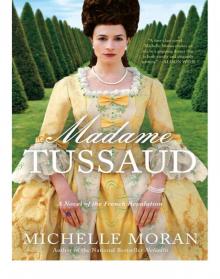 Madame Tussaud: A Novel of the French Revolution
Madame Tussaud: A Novel of the French Revolution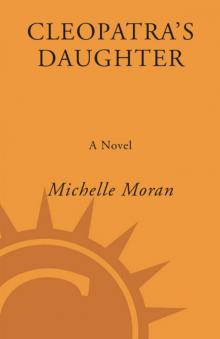 Cleopatra's Daughter
Cleopatra's Daughter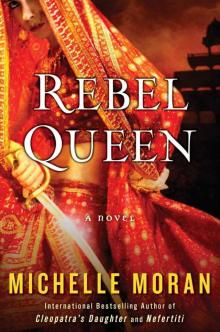 Rebel Queen
Rebel Queen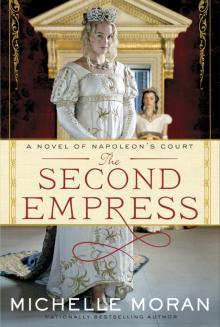 The Second Empress: A Novel of Napoleon's Court
The Second Empress: A Novel of Napoleon's Court Mata Hari's Last Dance
Mata Hari's Last Dance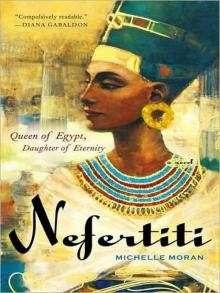 Nefertiti
Nefertiti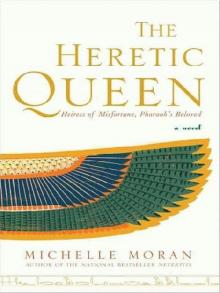 The Heretic Queen
The Heretic Queen The Egyptian Royals Collection
The Egyptian Royals Collection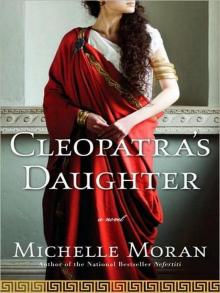 Cleopatra’s Daughter: A Novel
Cleopatra’s Daughter: A Novel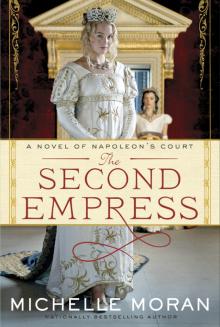 The Second Empress
The Second Empress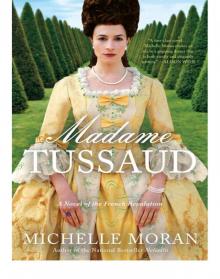 Madame Tussaud
Madame Tussaud